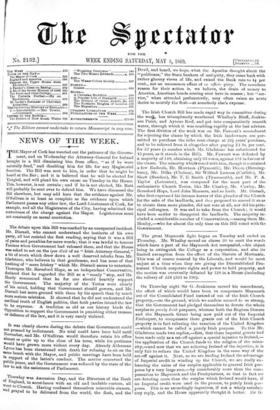The Irish Church Bill has made rapid way in committee
during the week, has triumphantly weathered Whalley's Bluff, Jeukinson Point, and Aytouu Reef, and got into comparatively smooth water, through which it was scudding rapidly at the last advice's. The first division of the week was on Mr. Fawcett's amendment for rejecting the clause by which the Irish landowners are permitted to purchase the tithe rent-charge at 22f years' purchase, and to be relieved from it altogether after paying .£4 9s. per cent. for 52 years (a number which Mr. Gladstone has substituted for 45 years, as it stands in the Bill). Mr. Fawcett was defeated by a majority of 148, obtaining only 33 votes, against 181 in favour of the clause. The minority whiclpvoted with him, though it contained a few Radicals, Mr. Morrison (Plymouth), Mr. Dixon (Birmingham), Mr. Dilke (Chelsea), Sir Wilfred Lawson (Carlisle), Mr. Shaw (Bandon), Mr. T. E. Smith (Tynemouth), and Mr. P. A. Taylor (Leicester), was composed for the most part of the enthusiastic Church Tories, like Mr. Charley, Mr. Cawley, Mr. Beresford Hope, Lord John Manners, and so forth. Mr. Disraeli, who first expressed his intense horror of this plunder of the Church for the sake of the landlords, and then proposed to amend it so as to obtain them more plunder, did not vote at all, nor did his principal colleagues. It was sad to take from the Church ; it would have been sadder to disappoint the landlords. The majority included a considerable number of Conservatives,—among them Mr. Henley,—who for almost the only time on this Bill voted with the Government.






























